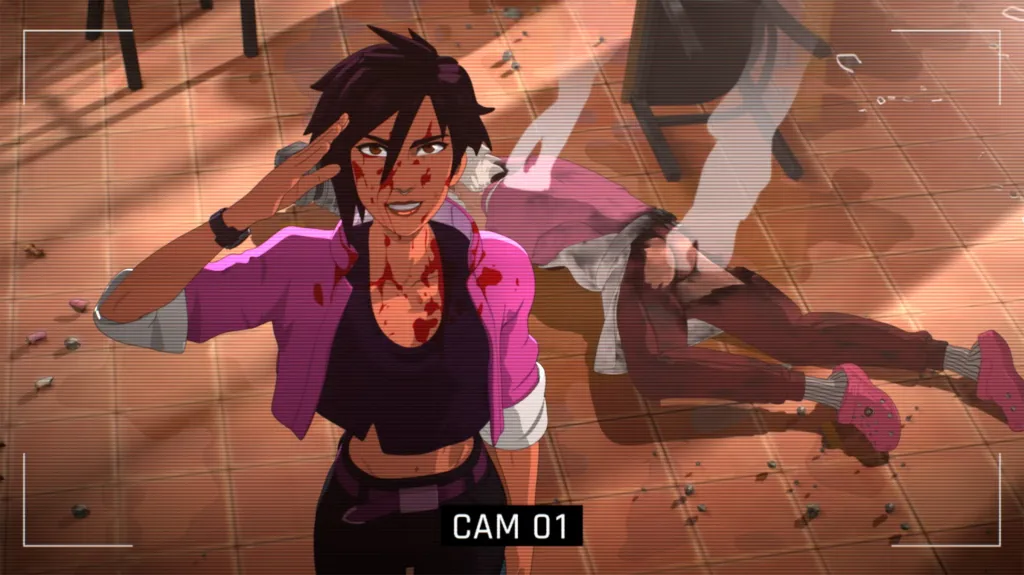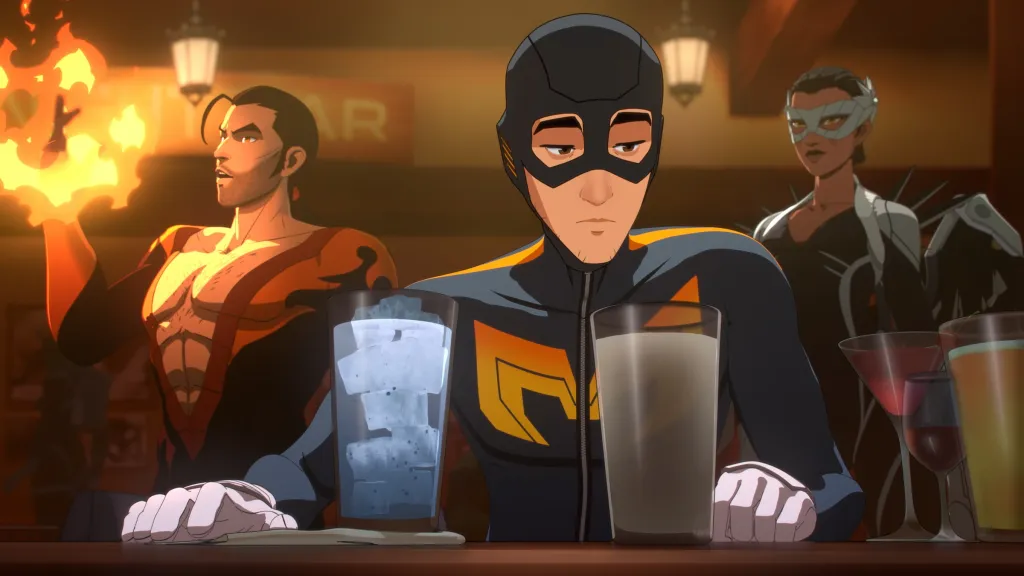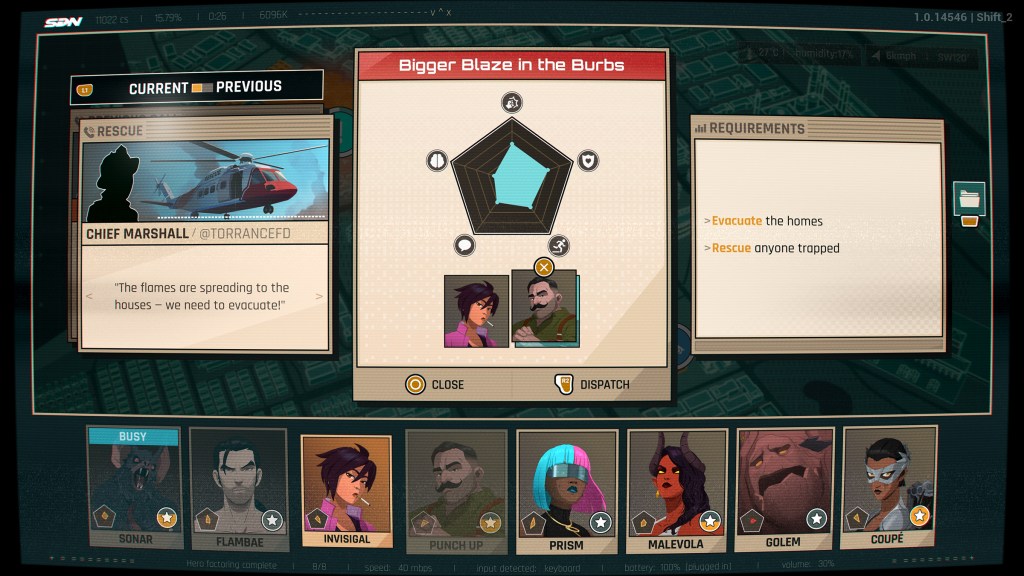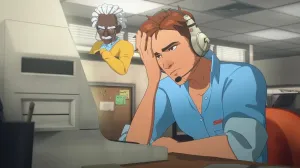The Telltale Games style of narrative adventure games has changed in wake of the studio’s implosion in 2018. Standards have been raised, so a straightforward entry in the genre without extraordinary writing might not cut it. 2023’s Star Trek: Resurgence and The Expanse — two Telltale-esque games made partially by ex-Telltale staff — both demonstrated this, as they both were decent yet unremarkable titles. Dispatch is yet another game built from the bones of old Telltale but misses the malaise that has inhibited this subgenre. Instead, this superhero-filled story’s first two episodes begin with a promising enough bang to already raise the standard for what this genre can do.
Videos by ComicBook.com
The debut episode of Dispatch succinctly illustrates the game’s brilliance in its very first scene. It begins with a therapy session before twisting the framing through both comedy and action, all while asking bigger questions that are undoubtedly going to bubble up later. It offers so much in this three-minute intro — an interrogation scene with a goofy hook, a few incredible jokes, a glimpse into protagonist Mecha Man’s psyche, and a tease at a greater villain — and it’s impressive not only from a scriptwriting perspective, but also in how it sets up such a high standard from the start.
Rating: 4.5/5
| Pros | Cons |
|---|---|
| Whip-smart writing filled with clever jokes | Some quick time events are hard to read |
| Fluid animation and a vivid art style make every scene sing | |
| Dispatching heroes is surprisingly deep and easy to understand | |
| Sublime pacing that moves scenes along quickly | |
| Expertly sets up near-term and long-term conflicts with well-orchestrated cliffhangers |
Dispatch Is Funny Like Few Other Video Games

The quality of each one of those aspects (and more) carries into later scenes, too. Dispatch’s comedic timing is impeccable and brought to life through its wit and animation. Its many types of jokes — from the expertly delivered retorts to the more physically oriented bits — are genuinely clever and feel like they were shaped into the funniest version possible through careful rewrites. There are no first draft jokes in sight, and it is simply funny in a way many video games aren’t.
It’s also animated in a way most other video games can’t even dream of. Like most acclaimed animated TV shows, scenes aren’t littered with repeating animations and don’t vary in detail from one moment to the next. It’s not common for games to always showcase their most intricate levels of animation like this. The Like a Dragon games or Ghost of Yotei, for example, can have exquisitely expressive cutscenes in one minute and relatively lower quality ones just a few minutes later.
It’s an understandable byproduct of scope since it isn’t feasible for a massive RPG to always have the most cutting-edge animations during every sequence. But it makes more sense for a game with a significantly smaller scope that is mostly cutscenes. It’s a smarter choice and it pays off in dividends. Dispatch’s saturated, comic book-esque art style is already beautiful to look at, so it’s excellent that its animations (and thoughtful cinematic framing) can match that quality.
Dispatch Nails Its Characters Intros

Pretty art and remarkable animation can only take a game so far, but Dispatch is packed with enough substance to make it more than a visual treat. It centers around Robert Robertson — an alliterative name its characters are quick to poke fun at — as he reckons with his inability to fulfill his duties as Mecha Man, a persona most comparable to Marvel’s Iron Man. The familial legacy of the moniker and associated feelings of inadequacy give this tale a necessary and personal heart, a gold mine that will ideally be delved into in later chapters. These more intimate internal struggles are woven into a broader quilt about a larger threat looming in the background.
Balancing personal and extrapersonal conflict is tricky, but Dispatch pulls it off by hinting at something bigger while still focusing more on Robert. Developer AdHoc Studio seems to understand players need to care about the protagonist first before he’s thrust into the inevitable sweeping plot with grander, supervillain-sized stakes. It’s smart to mainly hone in on Robert’s inner workings in these first two episodes, yet the other parts of its superpowered cast get their fair time to shine, too. These mutant rejects use charm and comedic hijinks in their limited screentime to briefly steal the show before moving out of the spotlight.
Dispatch is able to quickly warm players up to its characters through its writing, and this mainly speaks to how well it is paced overall. None of its sections linger for too long or indulge in pointless mini-games. Its lack of visible load screens keeps things moving, as well. These episodes are also shorter than most episodes seen in similar games, with both coming in at a little under an hour. This no-fat approach is a crucial part of its winning formula and leads to lean episodes that can cut right at a devious cliffhanger and leave players wanting more. Meandering episodes with too many superfluous puzzles would stunt the brisk pacing that makes Dispatch such a thrill.
Dispatch‘s Dispatch Mechanics Are Unexpectedly Solid

Puzzles often made up the weaker portions of Telltale’s games and usually led to poor or uneven pacing, but Dispatch’s gameplay segments are surprisingly strong enough to avoid that pitfall. Matching Robert’s new role as a superhero dispatcher, players occasionally partake in a mini-game where they must assign heroes to different emergencies. Certain crises call for certain skills, so it is up to the player to pick the right squad member for the job.
Analyzing an individual’s strengths and weaknesses, managing cooldowns, and keeping track of each’s unique skill all yield a level of strategy that’s rarely seen in this genre. There’s not one correct answer, either, and this openness is liberating. There still are quick time events and they’re a predictable formality at this point (although, some have vague cues that are frustratingly hard to read), but this more tactical gameplay mechanic is the true star here because it fits the narrative and is engaging in a way that doesn’t rely on reflexes. It remains to be seen how deep dispatching gets or if failures or successes can affect the story — it’s possible its effects were limited in this tutorial chapter — but it’s a mechanic that makes the game better, and that’s not a feature this genre can often claim.
Dispatch‘s first two episodes have set the bar incredibly high for the rest of the season. With a snappy script, killer jokes, superb pacing, shockingly well-realized dispatch mechanics, and wonderfully eloquent animation, this superhero-filled narrative adventure is already shaping up to be one of the genre’s finest. It’s unclear how the next few batches of episodes will shape up or how well subjects hinted at here will be followed up on, but that doesn’t change how these introductory episodes hit harder than a punch from Phenomaman.
A PS5 copy of Dispatch was provided by the publisher for the purpose of this review.









